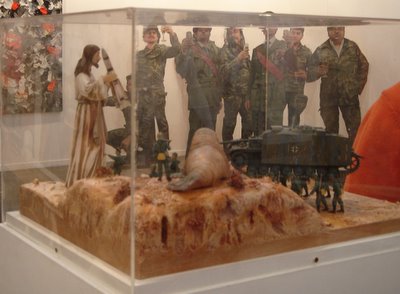No need to excerpt NRO, and worth posting in its entirety (as VDH always is)
The great wealth and leisure created by modern technology have confused some in the modern age into thinking that history is linear. We expect that each generation will inevitably improve upon the last, as if we, the blessed of the 21st century, would never chase out Anaxagoras or execute Socrates — or allow others to do so — in our modern polis.
Often such material and moral advancement proves true — look at the status of brain surgery now and 100 years ago, or the notion of equality under the law in 1860 and in 2006.
But just as often civilization can regress. Indeed, it can be nearly lost in a generation, especially so now, with technology acting as an afterburner of sorts which warps the rate of change, both good and bad.
Who would have thought, after the Enlightenment and the advance of humanism, that a 20th-century Holocaust would redefine the 500-year-old Inquisition as minor in comparison?
Did we envision that, little more than 60 years after Dachau, a head-of-state would boast openly about wiping out the remaining Jews? Or did we ever believe in the time of the United Nations and religious tolerance that radical Muslims would still be seriously promising to undo the Reconquista of the 15th century?
Did any sane observer dream, in the era of UNESCO and sophisticated global cultural heritage preservation, that the primitive Taliban would blow up and destroy, with impunity, the iconic Buddhist statues chiseled into the sandstone cliffs of Bamiyan that had survived 1,700 years of war, earthquakes, conquests, and weather? Surely those who damned the inadvertent laxity of the Americans in not stopping others from looting the Baghdad museum should have expressed far greater outrage at the far greater, and intentional, destruction inflicted by the Taliban. Unless, that is, the issue of artistic freedom and preservation was never really the principle after all, but only the realistic calculation that, while George Bush's immensely powerful military would not touch a finger of its loudest critic, a motley bunch of radical Islamic fascists might well blow someone up or lop off his head for a tasteless caricature in far off Denmark.
The latest Islamic outrage over the Danish cartoons represents an erosion in the very notion of Western tolerance. Years ago, the death sentence handed down to Salman Rushdie was the dead canary in the mine. It should have warned us that the Western idea of free and unbridled expression, so difficultly won, can be so easily lost.
While listening to the obfuscations of British Foreign Secretary Jack Straw about the Danish cartoons, I thought that next he was going to call for a bowdlerization of Dante's Inferno, where Dante and Virgil in the eighth rung of Hell gaze on the mutilated specters of Mahomet and his son Ali, along with the other Sowers of Discord. I grew up reading the text with the gruesome illustrations of Gustave Doré. Can Straw now damn that artist's judgment as well, when the next imam threatens global jihad, more terrorism, an oil cut-off, or to make things worse for Anglo-American troops who are trying to bring democracy to Iraq?
Surely he can apologize that the cross of the Union Jack offends British Muslims? Or perhaps the memory of what Lord Kitchener did in 1898 to the tomb of the Great Mahdi needs contemporary atonement — once one starts down the road of self-censorship, there is never an end to it.
Since Bill Clinton mentioned nothing about free speech and expression or the rights of a newspaper to be offensive and tasteless, but lectured only about cultural insensitivity and the responsibility of the media not to be mean to Muslims, why did he stop with the Danish cartoonists? Surely someone who has apologized for everyone from General Sherman to the Shah could have lamented the work of every Western artist, from Rodin to Dali, who has rendered the Prophet in a bad light.
Like the appeasement of the 1930s, we are in the great age now of ethical retrenchment. So much has been lost even since 1960; then the very idea that a Dutch cartoonist whose work had offended radical Muslims would be in hiding for fear of his life would have been dismissed as fanciful.
Insidiously, the censorship only accelerates. It is dressed up in multicultural gobbledygook about hurtfulness and insensitivity, when the real issue is whether we in the West are going to be blown up or beheaded if we dare come out and support the right of an artist or newspaper to be occasionally crass.
In the post-Osama bin Laden and suicide-belt world of our own, we shudder at these fanatical riots, convincing ourselves that perhaps the Salman Rushdies, Theo Van Goghs, and Danish cartoonists of the world had it coming. All the while, we think to ourselves about the fact thatwe do not threaten to kill Muslims when they promulgate daily streams of hate and racism in sermons and papers, and much less would we go about promising death to the creator of "Piss Christ" or the Da Vinci Code. How ironic that we now find politically-correct Westerners — those who formerly claimed they would defend to the last the right of an Andres Serrano or Dan Brown to offend Christians — turning on the far milder artists who rile Muslims. Y
The radical Islamists are our generation's book burners who search for secular Galileos and Newtons. They are the new Nazi censors who sniff out anything favorable to the Jews. These fundamentalists are akin to the Soviet commissars who once decreed all art must serve political struggle — or else.
If we give in to these 8th-century clerics, shortly we will be living in an 8th century ourselves, where we may say, hear, and do nothing that might offend a fundamentalist Muslim — and, to assuage our treachery to freedom and liberalism, we'll always be equipped with the new rationale of multiculturalism and cultural equivalence which so poorly cloaks our abject fear.
There are three final considerations. First, millions of brave reformers in the Muslim world are trying each day to create a tolerant culture and a consensual society. What those in Lebanon, Afghanistan, Iraq, and Egypt want from us is not appeasement that emboldens the radicals in their midst, but patient, careful, and firm explanations that freedom is precious and worth the struggle — even though its use can sometimes bother us. Surely the lesson from Eastern Europe applies: the oppressed there did not appreciate the realpolitik and appeasement of many in the West, but most often preferred a stalwart Reagan to an equivocating Carter.
Second, we, not the Islamists, are secure; our dependency on oil has masked a greater reality: that the Muslim Middle East, as in the days of the Ottomans, is parasitic on the West for advancements of all sorts, from heart surgery to computers. Most of the hatred expressed over the cartoons was beamed on television, through the Internet, or communicated over cell phones that would not exist in Pakistan, Syria, or Iran without imported technology.
The Islamists are also sad bullies, who hunt out causes for offense in the most obscure places, but would recoil at the first sign of Western defiance. Turkey may say little to the Islamists now, but they would say lots if the European Union decided to pass on its inclusion into the union. Local imams sound fiery, but if the West is too debauched a place for any pure Muslim to endure, why then do they not lead, Moses-like, an exodus of the devout away from the rising flood of decadence, and back to the paradise of a purer Syria or Algeria?
Third, the bogus notion of multiculturalism has blinded us to a simple truth: we in the West can live according to our own values and should not allow those radicals who embrace or condone polygamy, gender apartheid, religious intolerance, political autocracy, homosexual persecution, honor killings, female circumcision, and a host of other unmentionables to threaten our citizens within our own countries.
The deluded here might believe that the divide is a moral one, between a supposedly decadent secular West and a pious Middle East, rather than an existential one that is fueled by envy, jealousy, self-pity, and victimization. But to believe the cartoons represent the genuine anguish of an aggrieved puritanical society tainted by Western decadence, one would have to ignore that Turkey is the global nexus for the sex-slave market, that Afghanistan is the world's opium farm, that the Saudi Royals have redefined casino junketeering, and that the repository of Hitlerian imagery is in the West Bank and Iran.
The entire controversy over the cartoons is ludicrous, but often in history the trivial and ludicrous can wake a people up before the significant and tragic follow.





 Nailed It!
Nailed It! 